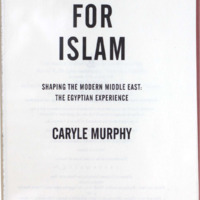-
Title
-
Passion for Islam : shaping the modern Middle East : the Egyptian experience
-
Description
-
Discusses Egypt's role in the growth of Islamic extremism.
-
Identifier
-
1054733
-
743235789
-
Creator
-
Murphy, Caryle
-
Source
-
Brian Lamb Booknotes Collection
-
Gift of Brian Lamb, 2011.
-
Catalog record
-
Language
-
eng
-
Date
-
2002
-
Program air date: November 3, 2002
-
Publisher
-
Scribner
-
George Mason University. Libraries. Special Collections & Archives
-
Subject
-
"Islam and state--Egypt--20th century."
-
"Islam and politics--Egypt--20th century."
-
"Islam--Social aspects--Egypt--20th century."
-
"Religious awakening--Islam."
-
Relation
-
Original Booknotes interview
-
Rights
-
This work may be protected by copyright laws and is provided for educational and research purposes only. Any infringing use may be subject to disciplinary action and/or civil or criminal liability as provided by law. If you believe that you are the rights-holder and object to Mason’s use of this image, please contact speccoll@gmu.edu.
-
Text
-
Transcription of Annotations
Notes on front endpapers provide some biographical information on the author and detail her experiences living in Africa and the Middle East. They also include statistical information on Egypt, e.g. the population of the country and of Cairo, the rates of illiteracy and unemployment and the per capita GDP. Notes under the heading 'Pious Islam' explain the revival of Islam as resulting from grinding poverty, tired lives, Zucchini (corruption), wastas (connections) over the past 30 years, and how the shock of losing the 1967 war lead to oil people leaving Egypt for Saudi Arabia. The chapter on 'Political Islam' mentions "ijtihad", the practice of exerting one's utmost to understand Islam which was introduced by Sheik Muhammad Abduh, the founding of the Muslim Brotherhood in 1928 and its goal of getting rid of the British and French foreign presence in Egypt, the failed assassination attempt on Nasser and the subsequent crack-down on the Brotherhood. Anwar Sadat allowed the Brotherhood to re-organize provided they renounce violence. This group's primary mission has always been the implementing of Shari'a. Notes highlight a 1994 Press Law which was passed by Mubarak and allowed reporters to be jailed while being investigated for slander. Notes on Ch.5. contain information on the Islamic group that planned Sadat's assassination. Ch. 6. reports on a meeting between Madani, a dangerous terrorist, and Kamal Khalid, a lawyer. Madani was subsequently tortured to death. Mubarak's efforts of putting the Muslim Brotherhood out of business are detailed in Ch. 8. Egypt's fundamental problem is identified as a lack of democracy. The biggest change that has occurred in Egypt is that now religion becomes before nationalism. Notes list several Anti-Christian massacres; 400,000 Copts now live in Canada and the U.S. The section titled 'Cultural Islam' refers to Khaled Salah Hassanein, a young journalist who used to be a member of the Islamic Jihad and contains a statement by Mustafa Mahmood contrasting Egypt and the U.S. Notes on Ch.9. explain that Egypt is a wasteland of political thought, where it is impossible to talk about secularism because it sounds too Western. The only frame of reference is religion. -- Annotations by Brian Lamb in the margins and underlining of pertinent phrases throughout the book. -- Example: p. 174: "What does the West have to offer other than Coca-Cola, hamburgers, blue jeans, Madonna, Michael Jackson, and the whole gamut of ephemeral pleasures?"...By contrast, "Islam offers mankind heaven and immortality ... [and] the eternal spirit that God breathes into all of us."
 1054733.pdf
1054733.pdf